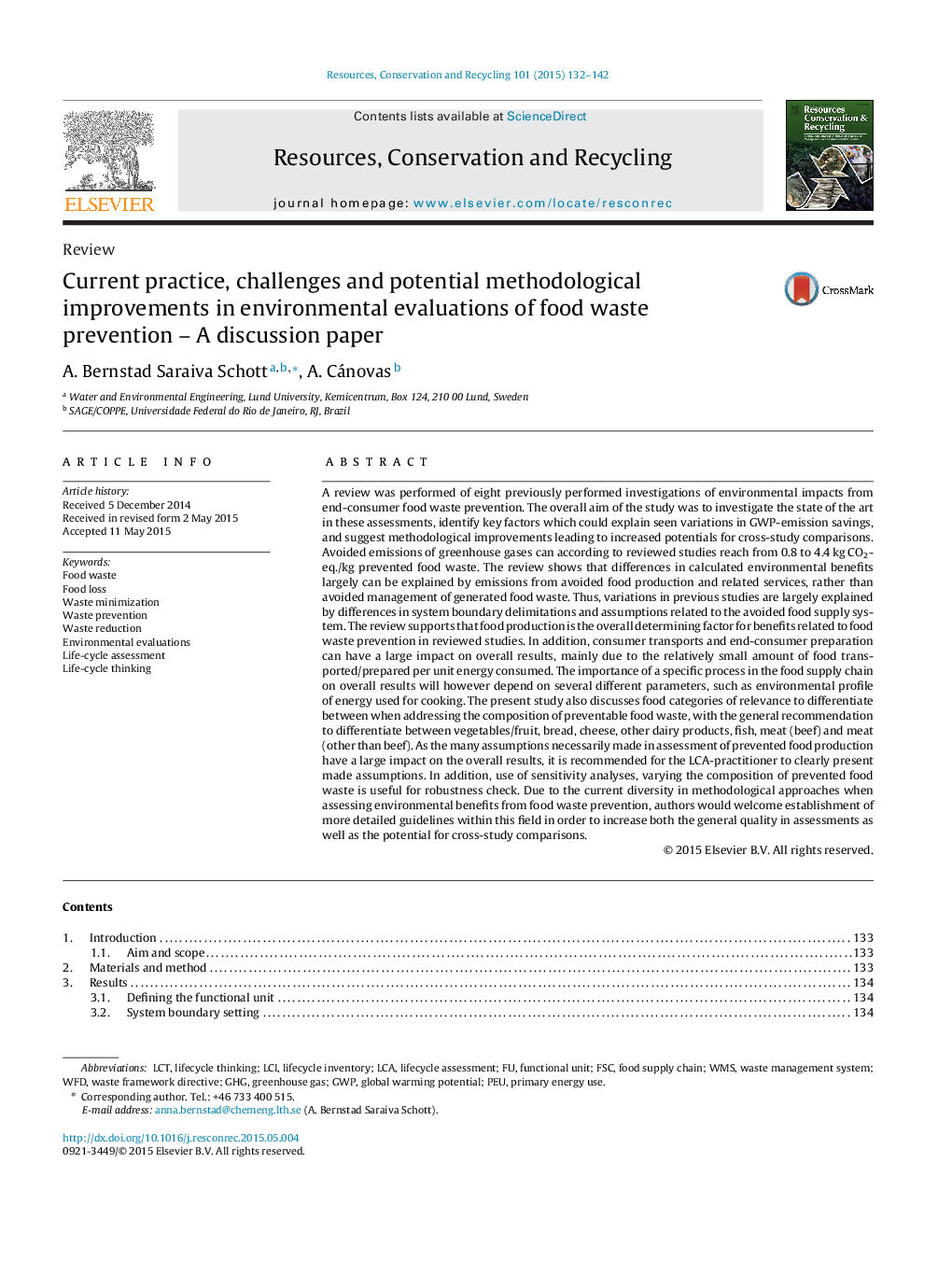| کد مقاله | کد نشریه | سال انتشار | مقاله انگلیسی | نسخه تمام متن |
|---|---|---|---|---|
| 7495127 | 1485688 | 2015 | 11 صفحه PDF | دانلود رایگان |
عنوان انگلیسی مقاله ISI
Current practice, challenges and potential methodological improvements in environmental evaluations of food waste prevention - A discussion paper
ترجمه فارسی عنوان
تمرین کنونی، چالش ها و پیشرفت های روش شناختی بالقوه در ارزیابی محیط زیست از پیشگیری از زباله های مواد غذایی - یک مقاله بحث
دانلود مقاله + سفارش ترجمه
دانلود مقاله ISI انگلیسی
رایگان برای ایرانیان
کلمات کلیدی
WFDPEULCTLCIWMSFSCGHGGWPLife-cycle assessment - ارزیابی چرخه حیاتLifecycle assessment - ارزیابی چرخه حیاتLCA - ارزیابی چرخه حیاتFood loss - از دست دادن غذاPrimary energy use - استفاده از انرژی اولیهWaste framework directive - دستورالعمل چارچوب زبالهFood waste - زباله های مواد غذاییFood supply chain - زنجیره تامین مواد غذاییWaste management system - سیستم مدیریت زبالهfunctional unit - واحد عملکردیglobal warming potential - پتانسیل گرمایش جهانیWaste prevention - پیشگیری از زبالهWaste reduction - کاهش ضایعاتWaste minimization - کمینه سازی زبالهGreenhouse gas - گاز گلخانه ای
موضوعات مرتبط
مهندسی و علوم پایه
مهندسی انرژی
انرژی های تجدید پذیر، توسعه پایدار و محیط زیست
چکیده انگلیسی
A review was performed of eight previously performed investigations of environmental impacts from end-consumer food waste prevention. The overall aim of the study was to investigate the state of the art in these assessments, identify key factors which could explain seen variations in GWP-emission savings, and suggest methodological improvements leading to increased potentials for cross-study comparisons. Avoided emissions of greenhouse gases can according to reviewed studies reach from 0.8 to 4.4Â kg CO2-eq./kg prevented food waste. The review shows that differences in calculated environmental benefits largely can be explained by emissions from avoided food production and related services, rather than avoided management of generated food waste. Thus, variations in previous studies are largely explained by differences in system boundary delimitations and assumptions related to the avoided food supply system. The review supports that food production is the overall determining factor for benefits related to food waste prevention in reviewed studies. In addition, consumer transports and end-consumer preparation can have a large impact on overall results, mainly due to the relatively small amount of food transported/prepared per unit energy consumed. The importance of a specific process in the food supply chain on overall results will however depend on several different parameters, such as environmental profile of energy used for cooking. The present study also discusses food categories of relevance to differentiate between when addressing the composition of preventable food waste, with the general recommendation to differentiate between vegetables/fruit, bread, cheese, other dairy products, fish, meat (beef) and meat (other than beef). As the many assumptions necessarily made in assessment of prevented food production have a large impact on the overall results, it is recommended for the LCA-practitioner to clearly present made assumptions. In addition, use of sensitivity analyses, varying the composition of prevented food waste is useful for robustness check. Due to the current diversity in methodological approaches when assessing environmental benefits from food waste prevention, authors would welcome establishment of more detailed guidelines within this field in order to increase both the general quality in assessments as well as the potential for cross-study comparisons.
ناشر
Database: Elsevier - ScienceDirect (ساینس دایرکت)
Journal: Resources, Conservation and Recycling - Volume 101, August 2015, Pages 132-142
Journal: Resources, Conservation and Recycling - Volume 101, August 2015, Pages 132-142
نویسندگان
A. Bernstad Saraiva Schott, A. Cánovas,
